The Veteran Conductor and Famous Cantor: Eli Jaffe and Zvi Weiss in Joint Conversation
Eli Jaffe never imagined a career in music, nor did Zvi Weiss foresee becoming the regular cantor at the Great Synagogue in Jerusalem. Their paths converged in recent years, leading prayers before vast congregations, especially as Rosh Hashanah approaches.
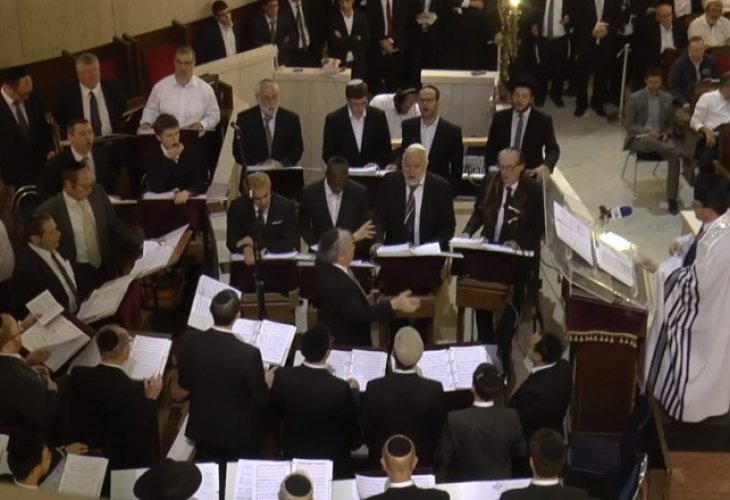
About three years ago, Zvi Weiss, the chief cantor of the Great Synagogue in Jerusalem, approached the renowned conductor Mordechai Sobol, of blessed memory, asking for a recommendation for a piyut to perform during the High Holidays. Sobol sent him musical notes for "Adam Yesodo Me'afar," suggesting it be performed on Yom Kippur 5779.
Weiss received the sheet music on the eve of Yom Kippur, right after Sobol's funeral, as Sobol had passed away unexpectedly that day. "I didn't perform the piece that year," he says with a voice full of emotion, "It was too difficult for me, but praying that holiday was an experience I will never forget."
Zvi Weiss has been leading prayers at the Great Synagogue in Jerusalem for about six years, stepping in as cantor on Shabbat throughout the year, and serving as the regular cantor during the High Holidays. "I've long realized that music can elevate you to the highest places, but when shallow, it can bring you down to the lowest. My mission is to connect with the music from a pure and sacred place, and equally important, to connect the congregation."
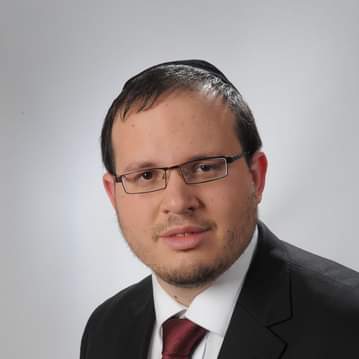
Goal: Sanctify Hashem's Name
In ordinary years (not marked by COVID-19), thousands from around the world come to pray at the Great Synagogue on Rosh Hashanah and during the High Holidays, captivated by Zvi Weiss's prayers and enjoying the unique choir led by the renowned conductor Eli Jaffe.
In our conversation, Jaffe reveals an interesting detail: "I didn't come from a musical home per se, but music was always around me. I actually began focusing on music at 19, which is quite late, but I knew I wanted to be a conductor and composer."
He conducts regularly at the Great Synagogue out of respect for his late father, who founded the synagogue. "I perform with a special choir that appears regularly on Shabbatot, and during the High Holidays, all choir members join us, creating a very unique prayer, attracting many from across the globe."
Jaffe recalls a memorable Rosh Hashanah evening when several Jewish members of the Berlin Philharmonic came to pray. "As they left the synagogue, they met friends from a Christian group, conversing in English. I overheard them marveling, 'Where else can one see such a magnificent prayer?' I was deeply moved. To me, this epitomizes 'In the multitude of people is a king's glory,' and it's my dream to sanctify Hashem's name."
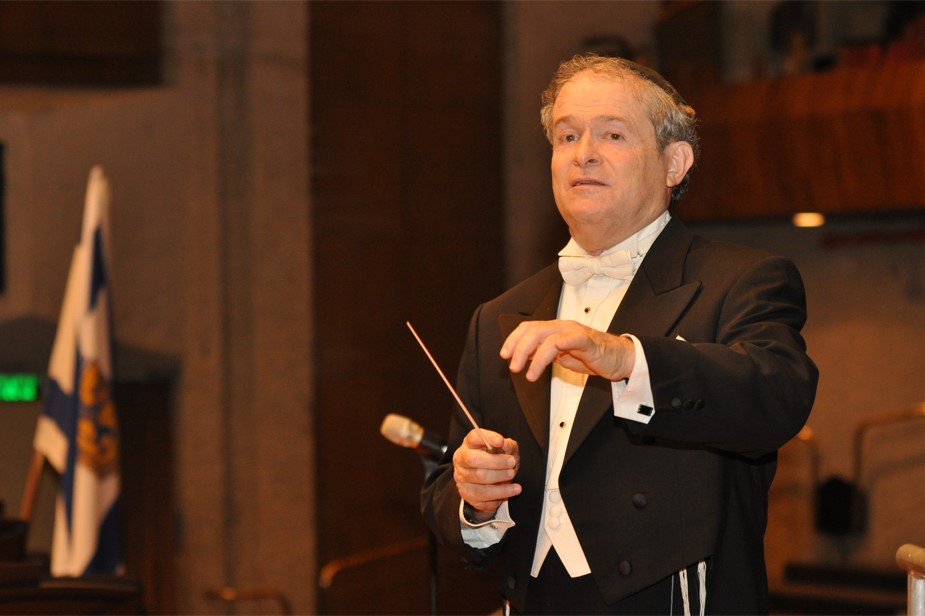 Credit: Yoni Rikner
Credit: Yoni RiknerZvi Weiss, regular cantor at the Great Synagogue, grew up in the USA and visited cantors long before he could sing. At five, he moved to Israel with his family, and music became integral to his life. "My father was a cantor mainly during the holidays, and I was deeply drawn to cantorial music, bonding with this world," he states. "As a child, I listened to singers on cassettes of that era, finding that particular music very appealing. Unlike children who generally prefer singing, I favored cantorial works."
"I never viewed cantorship as a profession," he emphasizes. "Only at 20, right after getting married, was I invited to serve for the first time as cantor at a synagogue in Bugrashov, Tel Aviv. For my debut, I prayed with the yeshiva tradition I had grown up with. Later, I was asked to continue for Rosh Hashanah and Yom Kippur, maintaining the same tradition. The following year, I found myself at one of the world's largest synagogues in the 'Ahavat Torah' community in New Jersey. To this day, I marvel at the courage to lead, following the famed cantor Chaim Adler, but from then on, it's history. In those days, I kept in touch with him to understand the needs of the community, eventually leading to my replacement as cantor at the Great Synagogue in Jerusalem, where I now pray."
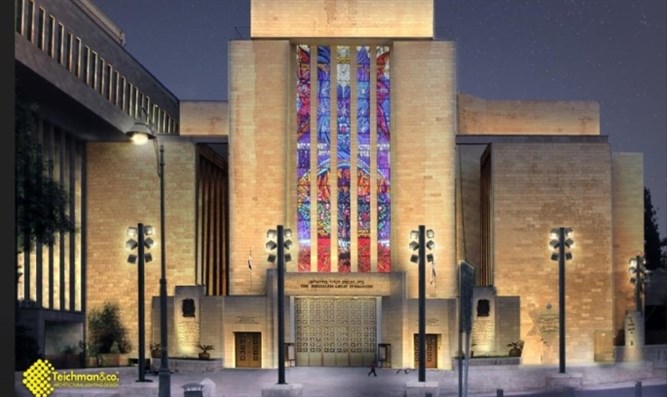
Purifying the Soul
How do you choose the melodies for the prayers?
"Of course, during holidays, there are fixed melodies," explains Jaffe. "For most songs, we try to stick to tradition, using familiar tunes for central prayers like 'Unetaneh Tokef' and others. At times, for pieces like 'Kedusha' or 'Zacharti Lach Brit Ne'urayich,' we introduce different tunes, considering what will resonate with the community and help them feel connected to Hashem. This year, we might need to shorten and won't be able to use all the usual melodies due to mask-wearing; the throat will dry up, making it hard to pray. The rabbis instructed us to shorten them."
As a conductor, doesn't it bother you that the congregation sometimes sings off-key or fails to join the choir?
"It's a fair question, but not at all. I understand the congregation isn't at the synagogue for a concert, but to pray. Our goal is for the choir to become part of the prayer and the prayer part of the choir."
How many members are in the choir?
"The choir has existed for 40 years, hosting hundreds of singers over time, some quite renowned, some unfortunately no longer with us. They come from all sectors and backgrounds: students, professors, soldiers, the devout, various ethnicities, and ages. It's a testament to the unity of the Jewish people."
Jaffe adds about the choir: "Initially, we debated whether to include non-religious Jews for prayer purposes. I consulted with rabbinic figures, and they all advised that this approach indeed unites hearts. With Hashem's blessing, many who joined the choir deepened their commitment to Torah and mitzvot. For that alone, it was all worth it."
He shares an interesting story: "During the great immigration from Russia, several Jews with no religious background joined our choir. Realizing this was a chance to bring them closer, I initially set ground rules: fasting on Yom Kippur and not driving to the synagogue on Shabbat or holidays. They generally complied. Once, on Sukkot, I was shocked - one member came by car. Alarmed, I asked why, and he replied that his host lit a flame from an existing one, leading him to think the holiday had ended, prompting him to drive. He didn't know it was a second holiday for the Diaspora. I took him aside, hugged him, and clarified. He grew immensely and now rigorously observes commandments according to the law."
Jaffe also mentions instances when he encountered people on Yom Kippur, surprised to find him wearing a sign on his white garment reading: "Sorry, I'm observing a speech fast, Gmar Chativa Tova." On one occasion, he came to pray and met President Rivlin and his wife; on another, the President of the Supreme Court was there to pray. Initially, it felt strange not being able to converse, but today, I can say it's one of the most recommended practices for Yom Kippur because it brings about a spiritual cleansing. I genuinely recommend trying it; it's a purification of the soul."
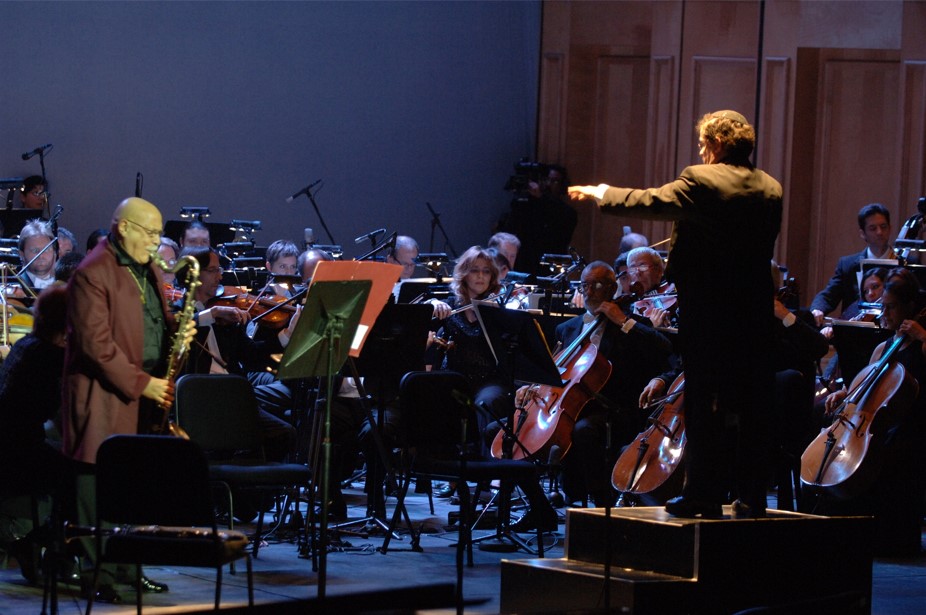 Photo: Fernando Aceves
Photo: Fernando AcevesAll Ethnicities, All Styles
Both Eli Jaffe and Zvi Weiss mention their continuous effort to learn and grow year-round. "I once heard a commentary regarding the Levites: why is it mentioned in one part of the Torah they worked in the Temple from age 25, and elsewhere it says from 30," shares Weiss. "The Ramban explains they started learning at 25, but the study lasted five years, starting their service afterward. I adopt a similar approach; there's no limit to learning. The more I learn, the more I realize my gaps and potential for growth."
"My main mentor was Dr. Mordechai Sobol, of blessed memory," he continues. "I studied under him for seven years, also learning from the esteemed cantor Moshe Stern, a surviving remnant of insight, whose cantorship flows in his veins."
Discussing Rabbi Moshe Stern, Weiss remembers: "I received a recording of his Ne'ilah prayer from 40 years ago. When I approached him for guidance to reproduce that unique melody, he replied: 'Even if I wanted, I couldn't guide you on that tune, as it emerged from my heart during that specific Ne'ilah instance; it can't replicate my current feelings, and if it would be just an imitation, it'd be better not to do it.' I deeply related to this approach. I believe cantorial music must emanate from the heart."
The Great Synagogue is known as having the world's most unique Jewish mosaic, with congregants from all backgrounds and denominations. How do you satisfy everyone's preferences?
"It's indeed a challenging task," agrees Weiss. "But I strive to break the cantorial music into sections, each having a different style: sometimes more Western European, other times Eastern. I often incorporate a Chassidic style, ensuring a taste of everything and blending them all."
Finally, which part of the prayer particularly resonates with you?
Jaffe: "I'm especially moved by the tune of 'On Rosh Hashanah it is written, and on the fast of Yom Kippur, it is sealed...' This melody moves me each time afresh, though perhaps I'm not entirely objective since I composed it."
Weiss: "I'm particularly connected to the pieces I perform spontaneously, emerging deep from the heart without strict musical dependence. These types of works can never be replicated, as their uniqueness lies in being born in that moment."

